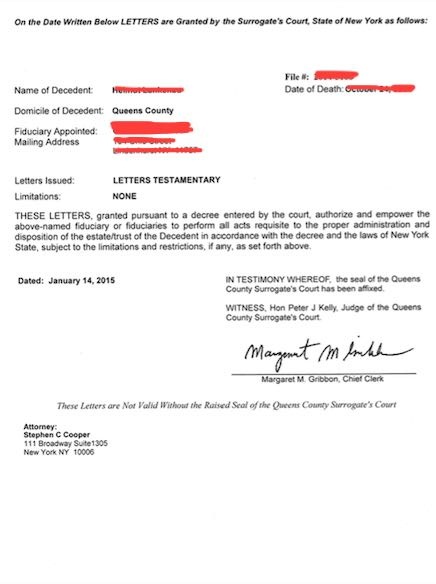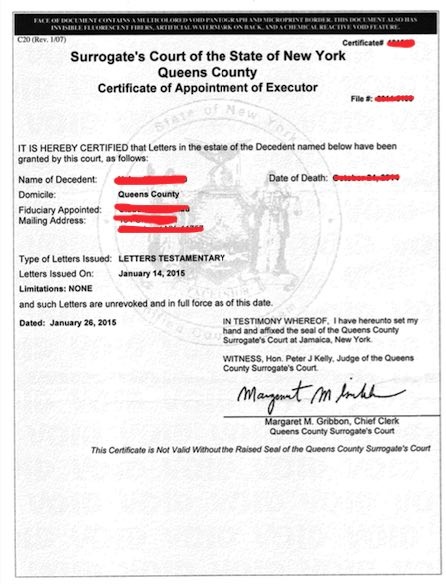How to Get a Letter of Testamentary
You want to know how to get a Letter of Testamentary, and we will explain how to do that. But for starters, we would like to clarify something important, to clear up some confusion. The document is actually called Letters of Testamentary, and it’s not a letter. It’s a court order.
This common confusion stems from the fact that “Order” used to be called “Letter” hundreds of years ago and the name stuck in courts to this day, even though regular people have long stopped using the word “letter” this way.
Steps you need to take to obtain a letter of testamentary
Since a letter of testamentary is an order, you can only get it from a court. Remember, it’s not a letter, so you can’t write it and your lawyer or anyone else can’t write it for you. Your attorney can get this order from the probate court. If you are looking for an attorney who will represent you in getting a letter of testamentary, you can contact us at [email protected].
In order to get a letter of testamentary, your attorney would have to apply to the Surrogate’s Court of the county where the person who died resided. You would need your estate attorney to help you get the documents together. These documents may include the following:
- petition for probate
- the original last will and testament
- the original death certificate
- a copy of the funeral bill
- waivers
- citation
- proposed order
- affidavit of heirship
- family tree
- due diligence affidavit
- affidavit of service
- affidavit of comparison
An attorney will also appear in court on your behalf. Both of those are useful things. If you are like most people, you don’t have any experience drafting legal documents or appearing at court hearings.
What does a letter of testamentary look like
As an example for your reference, here is a redacted picture of a letter of testamentary obtained by our law firm:

You often need more than one, since each bank and government agency would require an original. Also, some institutions require a more official-looking document. This is why the court can also issue a Certificate of Appointment of Executor, which is printed on a watermarked blue and red paper and looks similar to a death certificate, birth certificate or marriage certificate.
Here is a redacted picture of a Certificate of Appointment of Executor obtained by our law firm:
How long does it take to get a Letter of Testamentary
It typically takes a few months to get a letter of testamentary. If the probate is contested, i.e. if someone is challenging the will, then getting a letter of testamentary can take years, or they can be potentially denied altogether. Although getting the letters is only one of the steps of the probate process, it is the most important step.
If the person who died did not leave a will, the document will be similar and with similar powers, but it will be called “Letters of Administration,” and the Certificate will be called “Certificate of the Appointment of Administrator.”
What does a letter of testamentary do
A Letter of Testamentary permits a person to act on behalf of an estate of a person who died with a will. In other words, once a letter of testamentary is issued, you would represent an estate like a president represents a company or a mayor represents a town – you will have the legal authority to make decisions on behalf of the estate. An estate can include a number of people as beneficiaries, just like a company includes a number of people as employees and a city includes a number of people as citizens. As the representative of the estate, you would essentially have the authority to make decisions for them, at least as far as estate matters are concerned.
A Letter of Testamentary authorizes a person to act as a representative of an estate. They allow a person to perform the responsibilities of an estate. Here are some of the things a person can do once they are appointed as an administrator of an estate by letter of testamentary issued by the Surrogate’s Court:
- Obtain a tax id number for an estate from the federal government
- Open an estate bank account
- Request information from banks and other institutions that control the decedent’s assets. The banks will comply if you show them the letter of testamentary and the death certificate
- Transfer assets from the decedent’s name to the name of the estate
- Pay debts of the decedent
- Collect claims of the decedent
- Marshal assets of the estate
- Distribute the estate assets to the beneficiaries of the estate, after obtaining proper waivers or providing an accounting
Those things would be impossible to do without a letter of testamentary. The banks will not give you information and will not transfer the assets, the county recorder will not record property deeds, and a buyer will not buy a property from you.
Who qualifies to receive a letter of testamentary
A person who is nominated by a will to be an executor of an estate does not have the power or authority to act on behalf of an estate until they apply for, and are issued, letter of testamentary by the Surrogate’s Court. In other words, a will may say that you are the executor, but you are not an executor until the court says you are. Just the will is not enough. You do not have the power to represent the estate until the court says so and issues an order (called Letter of Testamentary) that gives you that authority.
To get a letter of testamentary, you not only have to be nominated by the will, but you also have to meet some other minimum qualifications.
- be over the age of 18
- not a convicted felon
- have the mental capacity
- not have issues with drugs or alcohol
- not suspected of dishonest conduct
You will need a separate letter of testamentary for every state
You will need a separate letter of testamentary for every state the person who died has property in. So even if the person died in a different state, and you have a letter of testamentary from that state, you will still need to obtain a separate letter of testamentary by verifying the out-of-state letter of testamentary through an ancillary probate proceeding. The document you will obtain will be called ancillary letter of testamentary.
If you are asking what is a Letter of Testamentary, you may need the assistance of an attorney. We at the Law Offices of Albert Goodwin are here for you. We have offices in New York City, Brooklyn, NY and Queens, NY. You can call us at 212-233-1233 or send us an email at [email protected].













